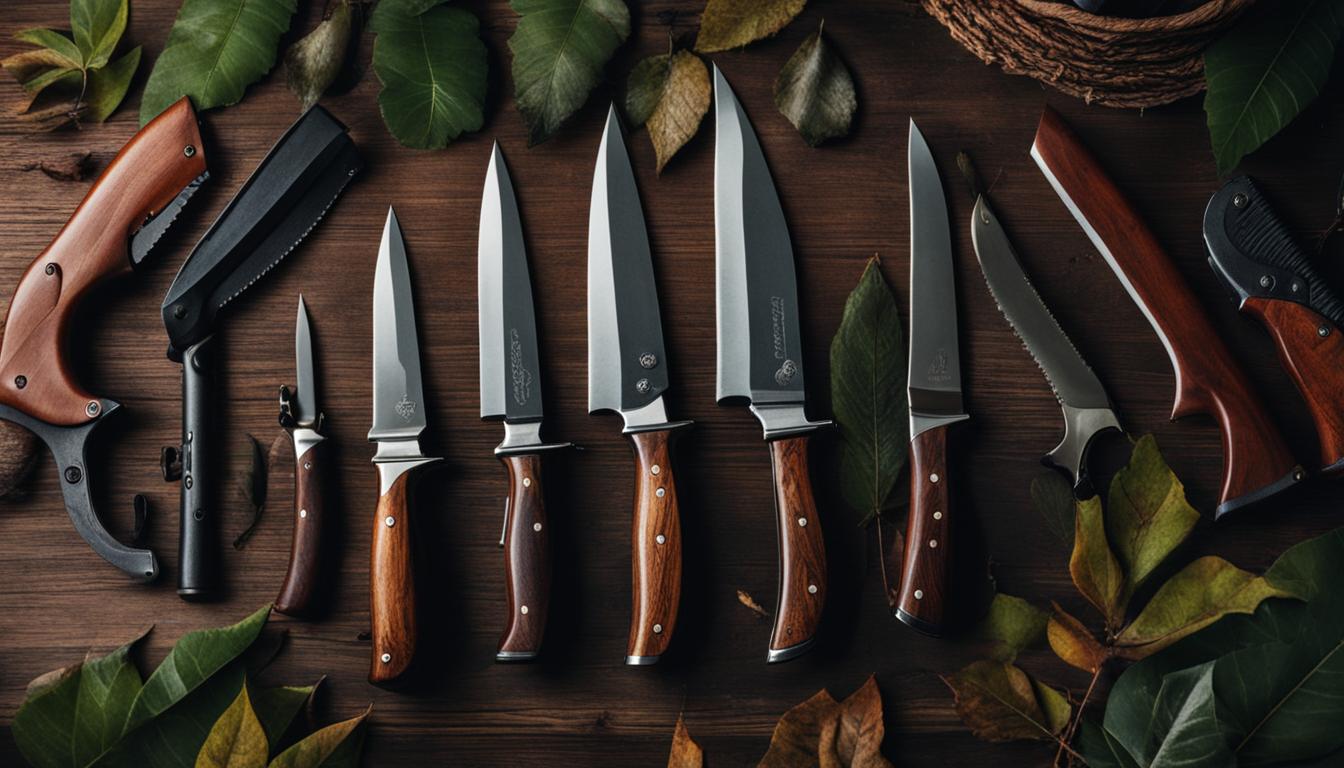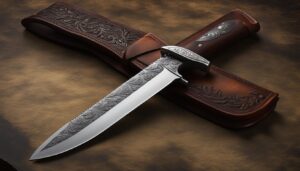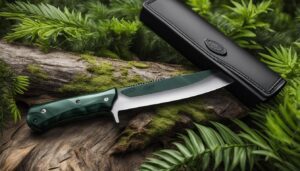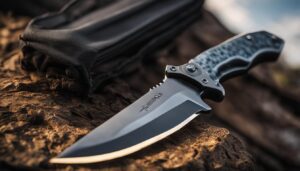When choosing a hunting knife, it’s important to consider its weight as it can greatly impact your performance in the field. The right weight can enhance precision and maneuverability, while the wrong weight can hinder your movements and tire you out quicker.
So, what is the recommended weight for a hunting knife? The answer depends on several factors, including the type of hunting you plan to do, the tasks you will be performing with the knife, and your personal preferences.
For hunters who prioritize precision and easy maneuverability, lightweight knives are the way to go. These knives typically weigh between 1.5 to 3.4 ounces and are perfect for making precise cuts and quick movements.
On the other hand, if you’re looking for a knife that can handle a wide range of tasks, from field dressing to butchering, a midweight knife might be the better choice. These knives weigh between 3.1 to 4.7 ounces and offer versatility without sacrificing too much maneuverability.
For heavy-duty tasks like chopping and processing game, heavyweight knives are your best bet. These durable knives weigh over 4.7 ounces and provide the necessary heft for tackling tough jobs in the field.
Lastly, some hunters may require specialty knives tailored to their specific needs, such as skinning, gutting, or boning. These knives often have unique designs and weight distributions to excel in their intended tasks.
Now that you know the basics of knife weight recommendations, it’s time to explore the factors that should be considered, the types of knives available, and how to care for your hunting knife to ensure its longevity.
Key Takeaways:
- The weight of a hunting knife can greatly impact performance in the field.
- Consider factors such as the type of hunting, tasks performed, and personal preferences when choosing the weight of your knife.
- Lightweight knives offer precision and maneuverability, weighing between 1.5 to 3.4 ounces.
- Midweight knives strike a balance between versatility and maneuverability, weighing between 3.1 to 4.7 ounces.
- Heavyweight knives are durable and reliable, weighing over 4.7 ounces and ideal for heavy-duty tasks.
- Specialty knives are customized for specific hunting needs, with unique designs and weight distributions.
Factors to Consider in Knife Weight
Choosing the right weight for a hunting knife is crucial for optimal performance in the field. To determine the ideal weight, several factors need to be taken into consideration.
Type of Hunting
The type of hunting you plan to do plays a significant role in determining the weight of your knife. If you engage in activities that require precision and finesse, such as small game hunting or fishing, a lightweight knife may be more suitable. On the other hand, if you participate in heavy-duty tasks like big game hunting or bushcraft, a heavier knife may provide the necessary durability and strength.
Tasks and Usage
Consider the specific tasks you will be performing with your knife. If you need a versatile tool that can handle various tasks like skinning, boning, and cutting, a midweight knife may be the best choice. Alternatively, if you have specialized needs such as gutting or field dressing, you might benefit from a specialty knife tailored to those specific tasks.
Personal Preferences
Your personal preferences also play a role in determining the weight of your hunting knife. Some hunters may prefer a lighter knife for its maneuverability and ease of use, while others may prioritize a heavier knife for its perceived durability and ability to handle tough tasks. Ultimately, it’s important to choose a knife that feels comfortable and balanced in your hand.
By considering factors such as the type of hunting, tasks performed, and personal preferences, you can make an informed decision about the ideal weight for your hunting knife.
Lightweight Knives: Ideal for Precision and Maneuverability
When it comes to hunting knives, lightweight options are favored by many hunters for their ability to offer precise cuts and easy maneuverability in the field. These knives typically weigh between 1.5 to 3.4 ounces, making them comfortable to carry and handle during long hunting trips.
The lightweight design of these knives allows for greater agility, enabling hunters to make quick and accurate cuts with minimal effort. Whether you’re field dressing game, skinning, or performing detailed tasks, a lightweight knife can provide the precision you need to accomplish these tasks effectively.
Not only do lightweight knives excel in precision, but they also offer enhanced maneuverability. Their low weight allows for swift movements and easy control, making them ideal for intricate tasks and delicate work. Whether you’re navigating through dense foliage or executing precise cuts, a lightweight knife provides the agility required for these situations.
A lightweight hunting knife is like an extension of my hand. It allows me to perform precise cuts effortlessly and gives me the maneuverability to handle any task in the field.” – Experienced Hunter
| Advantages of Lightweight Knives | Disadvantages of Lightweight Knives |
|---|---|
|
|
Overall, lightweight knives are a popular choice among hunters who prioritize precision and maneuverability. Their lightweight design allows for precise cuts and easy control, making them versatile tools in the field. However, it’s important to consider the limitations of lightweight knives, as they may not be suitable for tasks that require more heft or brute force. Ultimately, selecting the right knife weight depends on your specific hunting needs, preferences, and the tasks you plan to perform.
Midweight Knives: Versatile and All-Purpose
Midweight knives are the perfect balance between lightweight and heavyweight options, offering versatility and the ability to handle a wide range of tasks in the field. With an average weight ranging from 3.1 to 4.7 ounces, these knives are suitable for hunters who require a reliable tool for various functions.
Midweight knives are known for their versatility, making them ideal for both precision tasks and more demanding cutting and slicing tasks. They strike a balance between maneuverability and durability, allowing hunters to handle intricate cutting tasks with ease while still providing the necessary strength for heavier-duty work. These knives can be relied upon for activities such as field dressing, skinning, and preparing game for cooking.
One of the key advantages of midweight knives is their all-purpose nature. They are capable of handling a wide range of game, from smaller animals to larger game, making them a versatile choice for hunters who engage in different types of hunting activities. Whether you’re field dressing a small game or processing larger animals, a midweight knife provides the flexibility needed to adapt to various situations.
When choosing a midweight knife, it’s important to consider the handle design, blade material, and overall ergonomics. These factors can greatly impact the comfort and efficiency of your knife, ensuring a pleasant and effective hunting experience. Additionally, proper care and maintenance will extend the life of your midweight knife, allowing you to enjoy its versatility and reliability for many hunting seasons to come.
| Pros | Cons |
|---|---|
| Offers versatility for various hunting tasks | Not as lightweight as some other options |
| Provides the necessary strength for heavier-duty work | May not handle heavy chopping tasks as effectively as heavyweight knives |
| Allows for precision cutting tasks | Requires proper care and maintenance for longevity |
| Well-suited for both small and larger game |
Overall, midweight knives are a reliable and versatile choice for hunters who need a knife that can handle a variety of tasks in the field. With their balanced weight, these knives provide the maneuverability and durability necessary for precision cuts and all-purpose hunting needs.
Heavyweight Knives: Durable and Reliable
When it comes to hunting knives, durability and reliability are paramount. That’s where heavyweight knives come in. These knives are specifically designed to handle the toughest tasks in the field, making them the go-to choice for hunters who prioritize strength and resilience. With their robust construction and substantial weight, heavyweight knives offer the necessary heft for heavy-duty applications such as chopping and processing game.
One of the main advantages of heavyweight knives is their durability. The extra weight in these knives allows for stronger, sturdier blades that can withstand the rigors of hunting. Whether you’re field-dressing a large animal or performing other demanding tasks, a heavyweight knife will generally provide the reliability and strength needed for the job. These knives are often made from high-quality materials such as stainless steel, ensuring longevity and resistance to corrosion.
In addition to their durability, heavyweight knives offer a sense of stability and control. The weight of the knife helps to absorb the impact of each cut, providing better accuracy and reducing the risk of slips or mishaps. This increased control is especially crucial when dealing with larger game or performing intricate tasks that require precise cuts. The solid feel of a heavyweight knife in your hand can instill confidence and facilitate smooth, efficient movements.
Table: Comparison of Knife Weights
| Knife Type | Weight Range | Advantages |
|---|---|---|
| Lightweight Knives | 1.5 to 3.4 ounces | Easy to carry and handle, precise cuts, maneuverability |
| Midweight Knives | 3.1 to 4.7 ounces | Versatility, suitable for various tasks |
| Heavyweight Knives | Over 4.7 ounces | Durability, reliability, stability, control |
| Specialty Knives | Varies | Customized for specific hunting needs |
While heavyweight knives may not be as lightweight or maneuverable as their counterparts, their superior strength and reliability make them an excellent choice for hunters who prioritize durability. Whether you’re preparing a meal in the field or processing game, a heavyweight knife can withstand the demands of the task at hand, ensuring that you have a tool you can rely on for years to come.
Remember, choosing the right knife weight ultimately depends on your individual preferences and the specific tasks you’ll be performing. Consider your hunting style, the type of game you typically pursue, and the level of durability and control you require. By finding the perfect balance in knife weight, you’ll enhance your performance and have a trusted tool by your side for every hunting adventure.
Specialty Knives: Tailored for Specific Hunting Needs
When it comes to hunting, having the right tools can make all the difference. That’s where specialty knives come in. These knives are specifically designed and tailored to meet the unique needs of different hunting tasks. Whether you’re skinning, gutting, or boning, a specialty knife can provide the precision and effectiveness required for the job.
Specialty knives are customized to excel in specific hunting tasks. For example, a skinning knife typically features a curved blade that allows for smooth and effortless removal of animal hide. On the other hand, a gutting knife is designed with a narrow and sharp blade, enabling clean and efficient evisceration. Additionally, boning knives have a flexible and narrow blade that helps separate meat from bones with ease.
These specialized knives are crafted using high-quality materials and advanced manufacturing techniques. They undergo rigorous testing to ensure durability, sharpness, and overall performance. Specialty knives often incorporate ergonomic handles for a comfortable grip and enhanced control during precise cutting and slicing movements.
Table: Comparison of Specialty Knives
| Specialty Knife | Intended Purpose | Blade Design | Weight |
|---|---|---|---|
| Skinning Knife | Removing animal hide | Curved blade | Lightweight |
| Gutting Knife | Eviscerating game | Narrow and sharp blade | Lightweight |
| Boning Knife | Separating meat from bones | Flexible and narrow blade | Lightweight |
| Caping Knife | Precision work on small game | Fine and pointed blade | Lightweight |
It’s important to choose a specialty knife that aligns with your specific hunting needs. Consider the tasks you frequently encounter in the field and select a knife that is tailored for those purposes. Investing in a high-quality specialty knife can greatly enhance your efficiency and overall hunting experience. So, whether you’re a seasoned hunter or just starting out, don’t overlook the benefits of a specialized tool in your hunting arsenal.
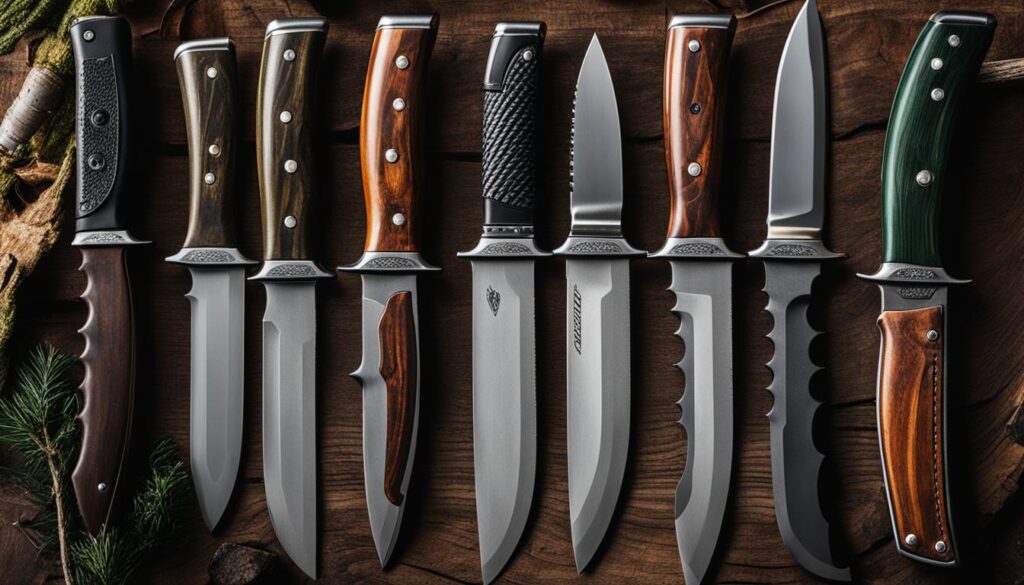
Care and Maintenance of Hunting Knives
Proper care and maintenance are essential for ensuring the longevity of your hunting knife. By following these knife care tips, you can keep your blade sharp, rust-free, and ready for action.
Cleaning
After each use, thoroughly clean your hunting knife to remove any dirt, debris, or residue. Use warm, soapy water and a soft brush to gently scrub the blade and handle. Be sure to dry the knife completely to prevent moisture buildup, which can lead to rust.
Sharpening
Regular sharpening is necessary to maintain the cutting edge of your hunting knife. Use a sharpening stone or honing rod to gently sharpen the blade. Maintain a consistent angle and make smooth, controlled strokes to achieve the desired sharpness. Remember to regularly check the knife’s sharpness and sharpen as needed.
Storage
Proper storage is crucial for protecting your hunting knife. Store it in a dry and secure place to prevent exposure to moisture and potential damage. Consider using a knife sheath or blade cover to protect the blade from accidental nicks or scratches.
Maintenance
In addition to regular cleaning and sharpening, there are a few other maintenance tasks you should perform to keep your hunting knife in top condition. Check the handle and screws periodically to ensure they are secure. If necessary, tighten any loose screws or fasteners. Apply a thin layer of oil to the blade and moving parts to prevent rust and promote smooth operation.
| Knife Care Tips | Frequency |
|---|---|
| Clean the knife after each use | After every hunting trip |
| Sharpen the blade | As needed or when dull |
| Store in a dry place | Whenever not in use |
| Check and tighten screws | Regularly |
| Apply oil for protection | Every few months |
By following these knife care and maintenance practices, you can ensure that your hunting knife remains in optimal condition, ready to assist you during your hunting adventures. Remember, a well-maintained knife not only performs better but also lasts longer, providing you with reliable service for years to come.


Conclusion
After considering various factors, I have concluded that finding the perfect balance in knife weight is crucial for hunters seeking precision and performance in their tasks. Whether you prefer a lightweight, midweight, heavyweight, or specialty knife, it’s essential to choose one that aligns with your specific hunting needs.
For those who prioritize maneuverability and precise cuts, lightweight knives weighing between 1.5 to 3.4 ounces are ideal. They offer easy handling and are suitable for tasks that require precision.
If versatility is what you seek, midweight knives weighing around 3.1 to 4.7 ounces strike a perfect balance. These all-purpose knives can handle a wide range of hunting tasks and are suitable for hunters requiring a knife that can perform various functions.
On the other hand, if durability and strength are your top priorities, heavyweight knives weighing over 4.7 ounces are recommended. These knives possess the necessary heft for heavy-duty tasks like chopping and processing game.
Remember, regardless of the weight of your chosen hunting knife, proper care and maintenance are vital for its longevity. Clean and dry your knife after each use, sharpen the blade regularly, and store it in a dry and secure place to prevent rust and damage.
In conclusion, by considering the type of hunting, tasks performed, and personal preferences, you can determine the ideal weight for your hunting knife. Choose wisely, take good care of your knife, and enjoy a successful hunting experience. Happy hunting!
FAQ
What factors should be considered when determining the ideal weight for a hunting knife?
The ideal weight for a hunting knife depends on several factors, including the type of hunting you plan to do, the tasks you will be performing with the knife, and your personal preferences.
How heavy are lightweight hunting knives?
Lightweight hunting knives typically weigh between 1.5 to 3.4 ounces. These knives are preferred by many hunters for their ability to offer precise cuts and easy maneuverability.
What tasks can midweight hunting knives handle?
Midweight hunting knives strike a balance between lightweight and heavyweight options. With an average weight of 3.1 to 4.7 ounces, these knives offer versatility and can handle a wide range of tasks in the field.
What are heavyweight hunting knives recommended for?
Heavyweight hunting knives are known for their durability and strength. These knives typically weigh over 4.7 ounces and provide the necessary heft for heavy-duty tasks such as chopping and processing game.
Are there specialty knives available for specific hunting needs?
Yes, some hunters may require specialty knives tailored to their specific hunting needs. These knives may have unique designs and weight distributions to excel in tasks such as skinning, gutting, or boning.
How should I care for and maintain my hunting knife?
Regardless of the weight of your hunting knife, proper care and maintenance are crucial for its longevity. Regularly clean and dry your knife after use, sharpen the blade as needed, and keep it stored in a dry and secure place to prevent rust and damage.
How can I find the perfect balance in knife weight?
To find the perfect balance in knife weight, consider factors such as the type of hunting, tasks performed, and personal preferences. Whether you choose a lightweight, midweight, heavyweight, or specialty knife, the ideal weight will depend on your specific needs and requirements.
